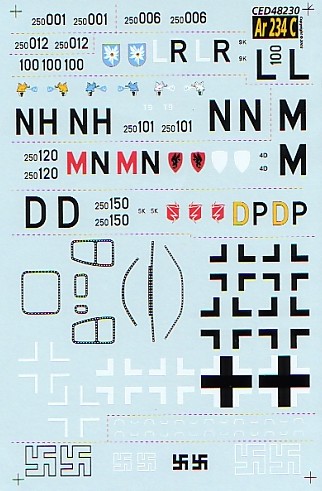|
S u m m a r y
|
| Catalogue
Number: |
CED48230 Arado AR 234 C |
| Scale: |
1/48 |
| Contents and Media: |
Double-sided full colour
letter-sized instructions plus notes sheet; 1 x full-size decal
sheet. |
| Price: |
USD$9.99 from
Meteor Productions website |
| Review Type: |
FirstLook |
| Advantages: |
Perfect registration,
inclusion of canopy framework, sharp clear printing, good
variety of markings |
| Disadvantages: |
|
| Recommendation: |
Recommended |
Reviewed by Rob Baumgartner

HyperScale is proudly sponsored by Meteor
Productions
Various versions of the
Arado 234 have been kitted, and as of a few years ago some have
really been “state of the art”.
Revell’s kit of the C-3
version has been chosen as the subject of this sheet, which offers a
total of seven options.
 Not
too many of these aircraft were built so how did Cutting Edge manage
to provide this many subjects…by incorporating Luftwaffe ’46! Not
too many of these aircraft were built so how did Cutting Edge manage
to provide this many subjects…by incorporating Luftwaffe ’46!
- Arado 234 C-3,
W.Nr.250001, Prague-Rusin
Wearing a finish of RLM
81/82 on its upper surfaces and RLM 76 beneath, this aircraft’s
splinter pattern is only broken up by the national markings. These
consist of outline form only, which are white for the fuselage and
upper wing surface and black for those under the wing. The tail also
shows the outlined form of the Harkenkreuz and the unusual
style of black Werknummer.
- Arado 234 C-3, KG 51,
“Luftwaffe 1946”
This is where the guys at
Cutting Edge can have some fun. This rendition shows a machine from
KG 51 that has its upper surfaces in RLM 81 and the lower parts in
the so-called “RLM 84”. A nice version of the edelweiss badge is
supplied as well as the “white L” and “black R” code letters. A
black version of the former is also provided for the underside of
the wings.
- Arado 234 C-3,
W.Nr.250006, München-Riem
Again we see what is assumed
to be the standard RLM 81/82/76 finish of these aircraft.
This (the sixth Ar.234C-3)
is much like option 1 except that it wears a much-reduced form of
the Harkenkreuz on the tail. Note also that an area around it
has been masked, thus revealing the underlying colour.
- Arado 234 C-3, KG 30,
“Luftwaffe 1946”
A tropical scheme this time
as if the type were operating in North Africa. RLM 79 over RLM 78
under surfaces is the order of the day with code letters of a red
“M” and a black “N”. The diving eagle badge is supplied in two parts
so that there can be no problems with registration.
- Arado 234 C-3,
W.Nr.250012, Prague-Rusin
This is CED’s last of the
actual schemes that could be seen on these aircraft. The black
Harkenkreuz is again of the small type but no masking is
apparent. Standard late war Balkenkreuze of the usual
outline type are used on the aircraft with white prevailing above
the wings and black applied beneath.
- Arado 234 C-3, KG 3,
“Luftwaffe 1946”
So what about the aircraft
operating in winter? Well, this scheme sees the standard splinter
pattern covered with a coat of white temporary paint to effect some
“snow camouflage”.
It makes for a very
attractive scheme with the yellow engine cowl and code letter…not to
mention the red and white unit badge.
- Arado 234 C-3, Kommando
Sperling, “Luftwaffe 1946”
This is the final option and
can be compared to the option above except without the winter
“whitewash”. With a white engine cowl ring and black code letters,
it almost looks “normal”. Three versions of the “gas propelled” unit
emblem are supplied so you can certainly have fun with this one.
A full set of national markings is included for any of the aircraft
portrayed but the real bonus is the decals that supply the cockpit
framework. This will certainly save a lot of time and effort as
painting it could be a potential nightmare.
There were no register problems with any of the items and the colour
density appeared to be very good. The carrier film was lovely and
thin and in most cases only barely extended past the printed image.
This was quality control at its best.
So there we have it. This is
obviously not a subject that has a lot of variations in markings so
Cutting Edge decided to provide some of their own.
The canopy framing is a
novel feature and if the clear plastic parts are coated with
“Future” or something similar, then adhesion shouldn’t be a problem.
Recommended.
Thanks to Meteor Productions for the sample
Review Text Copyright © 2004 by
Robert Baumgartner
Page Created 29 December, 2004
Last updated
29 December, 2004
Back to
HyperScale Main Page |
Home | What's
New | Features
| Gallery |
Reviews | Reference
| Forum
| Search